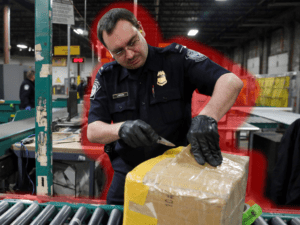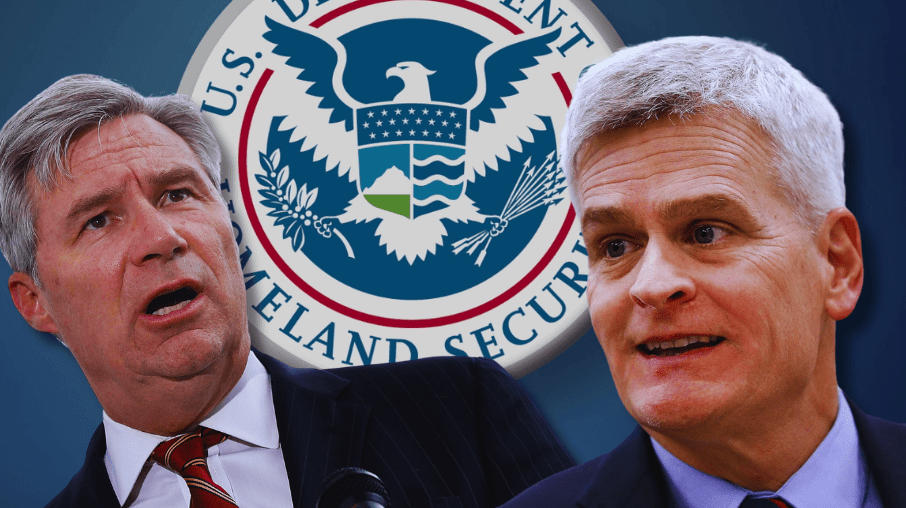A bipartisan duo of Senators are looking for clarity on what exactly is being shipped into the United States in a new bill that would require disclosure of certain bill of lading information for goods imported via aircraft, truck, and cross-border rail manifests. Currently, these disclosures only happen with ocean vessel shipments.
The bill, called the Manifest Modernization Act, was introduced last week by Sens. Bill Cassidy (R-LA) and Sheldon Whitehouse (D-RI).
The current law is “falling short of a goal Congress set decades ago,” Sen. Cassidy said. “This fix is overdue and urgent.”
“Drug traffickers and human rights abusers rely on transparency gaps in trade data to move illicit products. Shining a light on opaque air and vehicle imports will help law enforcement keep American consumers and companies safe from unsafe or counterfeit goods,” said Sen. Whitehouse.
Ocean vessels are required to disclose manifest information to U.S. Customs and Border Protection (CBP) agents – these are paper documents explaining what is being shipped to the U.S. and includes the name and address of the shipper, general character of the cargo, number of packages and gross weight, name of vessel or carrier, port of exit, port of destination, and country of destination. This data has been used in investigations to identify Russia sanctions evasion schemes, uncovered Uyghur forced labor in China supply chains, tracked tainted pharmaceutical products from India, and helped law enforcement uncover drug smuggling.
But in hearing after hearing on Capitol Hill regarding the CBP and its duties, people have told both the Senate and House that shipments via air, in particular, were not subject to the same rules as traditional ocean cargo.

The Manifest Modernization Act will be part of a larger bill. The proposal, by Sens. Cassidy and Whitehouse, seeks to require air shippers and trucks crossing from Mexico and Canada to follow the same Customs rules as ocean shippers.
The Cassidy/Whitehouse bill would change that.
According to the two Senators, nearly half of the value of imports come by either air or land, trucked in across the Mexican border – a veritable hornet’s nest of counterfeit, narcotics, and human smuggling, as well as legit commercial goods.
Congress passed legislation in 1996 to require aircraft manifests, but courts interpreted a technical drafting error in a later bill that prohibited the public disclosure requirement from applying to aircraft manifests, and the rule stands. Vehicles, including trucks and rail, have never been required to disclose manifest information.
The Manifest Modernization Act speaks to a world where global e-commerce means consumers can place orders online and get it shipped directly to their house from marketplace sellers located in China and elsewhere, hosting their wares on platforms like Amazon and Alibaba.
Over the last few years, the explosion of e-commerce sales has led to a consumer-direct model that often has Americans able to shop for, and order directly from producers overseas. These goods come in by the millions per day, usually by plane. CBP says it can keep up with the contents of these packages, but others have disagreed. This is especially true with regard to the Uyghur Forced Labor law and CBP’s own withhold-release orders on cotton goods sourced from Xinjiang. It is next to impossible for CBP to verify that clothing shipped directly from China is made from banned cotton, for example. The air shippers are not required to provide that granular info on its packages as the merchant marine shippers are.
All shipments aside from de minimis, including Informal Entries above the de minimis threshold, are required to submit an Entry Summary on CBP Form 7501. The Entry Summary is the most vital document for enforcing customs laws, and the hundreds of laws of dozens of Partner Government Agencies. The Entry Summary provides critical information about the financial transaction underlying the import, as well as essential data about the merchandise including the name of the supplier and the Harmonized Tariff Schedule of the United States (“HTSUS” or “HTS”) number.
In contrast, manifests contain little of this information, as they are focused on the movement of the shipment, not the underlying financial transaction. Similarly, the Air Cargo Advance Screening (ACAS) program “evaluates air shipments for threats to aviation.” It is not in any manner a substitute for an Entry Summary, although it is sometimes misrepresented as such.
Without an Entry Summary, the imports are not even recorded in official U.S. Census data, as CPA wrote in a letter to four Senators, including Cassidy, in July of this year. The Wall Street Journal published a front-page cover article titled “The $67 Billion Tariff Loophole That’s Undermining U.S. Trade Policy” and a subsequent article titled “The Tiny Trade Loophole That Understates the Trade Deficit With China,” published recently.
Consumer Protection Out The Window
In his writing of the bill, Sen. Whitehouse is concerned about product safety, too. So is the Consumer Products Safety Commission (CPSC), which said in a 2019 report that they, and other agencies responsible for consumer product safety (think tainted, or fake health supplements, or dangerous chemicals in makeup sold online from markets overseas) cannot possibly policy shipments of consumer goods sold in small quantities on line. The CPSC wrote that for de minimis shipments, “due to a lack of data, the level of risk associated with these shipments is largely unknown. Many agencies anticipate challenges in processing additional data from CBP’s voluntary Entry Type 86 pilot program.” The CPSC said it anticipates that CPB will benefit little from that pilot program targeting a handful of products, and would continue to experience data and targeting challenges involved in small shipments coming in by plane and truck.
The CPSC also stated in its 2019 report that its “current staffing model is focused on optimizing resources in the traditional import environment, with a concentration on larger commercial shipments; and that the model was not designed to address smaller imported packages. As importers are not required to submit a traditional Entry filing for de minimis, CPSC said they have limited data on what is being shipped in via online orders.
Furthermore, growing numbers of these shipments are entering the United States through express courier and international mail facilities where CPSC does not have staff.
CPA supports this effort and believes manifest data should be required for all imports, regardless of the mode of transport. This data is invaluable for the commercial sector in supporting trade enforcement.
The bill will eventually be rolled into a much larger “21st Century Customs Framework” (“21 CCF”) bill, which Cassidy and Whitehouse will be introducing in a few weeks.













